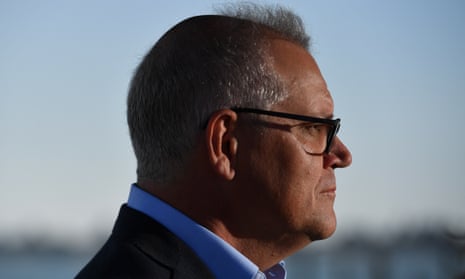What does our Pentecostal prime minister think of the devil? Now we have at least a partial answer: the “evil one” is using social media to steal young people’s hope. And we need to “raise up spiritual weapons” in response.
That was among rare glimpses into Scott Morrison’s theology, revealed while bearing witness at the Australian Christian Churches national conference last week.
The church’s website says that “official invitations were extended to the national office of the prime minister, as well as to federal members across the political spectrum”. Morrison’s office said the taxpayer-funded flight was typical of his attendance at “many other stakeholder events, including for other religious groups such as Copts, Maronites, Jewish, Hindu, Buddhist and Muslim”.
The financial and security arrangements might have been the same, but Morrison convincingly conveyed to his Pentecostal audience that he is one of them.
He told the audience, for example, that at a low point in the 2019 federal election campaign he had felt encouraged by seeing “the biggest picture of a soaring eagle that I could imagine, and of course the verse hit me”. What verse? He didn’t have to tell his audience – they all knew Isaiah 40:31.
Morrison explained that when the people he met in disaster evacuation centres thought he was just giving them a hug, he was really practising “laying on of hands”, which in Pentecostal practice is part of prayer for divine healing with the help of the Holy Spirit.
On this occasion, he stressed “community”. Quoting the late Rabbi Jonathan Sacks, Morrison argued (misleadingly) that “our rights used to be how we were protected from the state, and now [rights are] what we expect” from government. He said: “What once we expected from family and community” we now expect from “the state and … the market”. He emphasised the need for family and community to instil morality, and quoted economist Friedrich Hayek: “Freedom has never worked without deeply ingrained moral beliefs.” Neither government nor markets can supply that, Morrison said. It comes from community, and he gave churches as an example.
Community is important because it (paradoxically) values people as individuals, he said, and “we cannot allow what we’re entitled to to become more important than what we’re responsible for”. That led to his concern with “identity politics”, which divides Australians into “tribes”, where people “see themselves as only defined by belonging to some group”, in the process losing sight of the “beating heart” in each individual. The result is that “you lose your humanity”.
Some might see the PM’s insider talk, turning from the “evil one” to churches-as-community, as a 23-minute-long exercise in identity politics, aligning him with “some group”, namely the Pentecostal audience.
Some might also see many of the Australian Christian Church’s concerns as identity politics. Its doctrinal basis divides humanity into two groups: believers, who have been “made pure in heart and wholly sanctified, through the operation of the Holy Spirit, by the blood of Jesus and the word of God”, and “the wicked”, who “wilfully reject and despise the love of God manifested in the great sacrifice of his only son” and are therefore destined for “eternal punishment” in “the lake which burns fire and brimstone”.
Its current e-magazine carries two articles dealing with the belief, widespread among conservative churches, that anti-discrimination law restricts religious freedom. Illustrated with a Bible draped in chains and a padlock, one article warns pastors: “Within two years it is highly likely that every Australian state will have some legislation that will restrict your freedom to speak in certain areas, including communicating some truths of the bible.” Which areas? Which truths? The writer doesn’t say, beyond a vague warning that “someone from the government” might ask whether a pastor’s statement would “discriminate against anyone”.
Such vague-but-scary warnings are part of a widely documented Christian persecution narrative that paints conservative Christians as the victims of those who anti-discrimination law is designed to protect, especially LGBTQI+ groups. Writing in the Australian Journal of Human Rights, Rev Dr Elenie Poulos criticised such arguments for using “the idea of ‘religious freedom’ … as a stalking horse to assert and maintain the privilege of the institutional, hierarchal, patriarchal church”.
Morrison’s government has not yet introduced the religious discrimination bill, whose second draft was released in December 2019 and would entrench the rights of religious institutions to discriminate against staff on the basis of religion. But neither has Morrison rushed the long-promised legislation to protect LGBTQI+ students and teachers from being expelled or sacked from religious schools and colleges.
Morrison has told us several times that God directly intervenes in human affairs. One such “miracle” was his 2019 election win, and at the conference he quoted Hillsong’s Brian Houston: “Use what God has put into your hand to do what God has put into your heart.” (He also quoted the prosperity gospel slogan “blessed to be a blessing”.)
Morrison is far from alone among Australian prime ministers either in holding religious beliefs or in talking publicly about them. But he is unusual in modern times in expressing such a direct sense of divine calling to the office of prime minister.
Morrison often insists, including to the Australian Christian Church, that his faith is “not political”. In one way, he’s right: politics is about negotiation. You can’t negotiate with the evil one, you can only try to vanquish him, whether with “spiritual weapons” or other means.
The largest group answer to the “religion” question in the last census was “no religion”. Most Australians – including many Christians – do not share Morrison’s worldview. But religiosity can still signal things voters are looking for, like sincerity, and commitment to something beyond the political game. On the other hand, voters get worried by arrogance. A sense of divine appointment can be risky.
